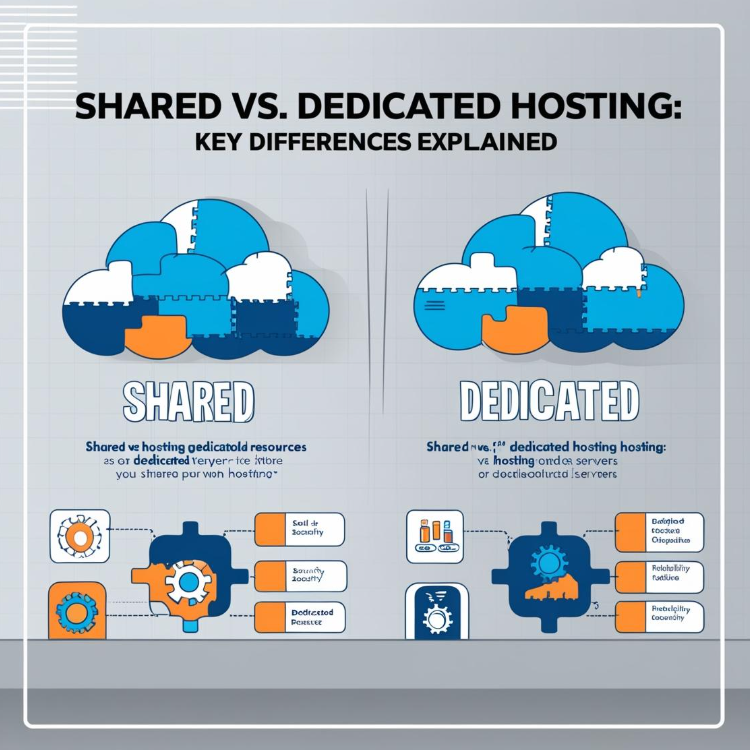Learn the main differences between shared vs dedicated hosting in our informative article. Find out which option best suits your website according to your preferences, your pocket, and the level of performance you want.

In today’s digital world, it is crucial to find a good hosting plan for your website to be successful. Be it being a blogger, a small business owner, or a manager of an e-commerce site; whatever hosting plan you select can affect the performance, security, and scalability of that site. Various hosting options are available out there. Among them, shared hosting and dedicated hosting are two of the most significant ones.
The current options feature their advantages, but they serve different types of websites and requirements. If you’re planning on which hosting service to select, then it’s very important to know what the differences between shared vs dedicated hosting mean. This post dives deep into the characteristics of two types of hosting, their pros, and cons and finally lets you choose the right one for your website.
What is Shared Hosting?
Shared hosting represents one of the cheapest possible hosting types, especially for new and small websites. As the name suggests, shared hosting means that your site shares a single server and all of its resources-with its CPU, memory, and bandwidth, among several other websites. It is an entry-level solution designed to satisfy individuals and businesses with moderate traffic who have rather simple requirements for hosting.
Advantages of Shared Hosting:
- Cost-effective: Shared hosting is the least expensive form of hosting because the maintenance and running costs of the server are shared among several websites.
- User-Friendly: Most shared hosting plans include intuitive control panels (like cPanel) and one-click installers for applications such as WordPress, making it easier for novices to manage their websites.
- Managed Services: Most shared hosting providers would care about server maintenance, unwanted security patching, and software updating, so you can focus on web content rather than server management.
Common Uses of Shared Hosting:
- Private Blogs or Portfolios: Shared hosting is a cheap and simple way to launch a website if you’re just starting up a personal blog or an online portfolio.
- Websites of Small Businesses: Very small businesses with very limited traffic can take advantage of shared hosting since it offers most of the basic features that one needs to create an online presence without going broke.
- Non-profit Organizations: Shared Hosting is a way for charities and community projects seeking to put their work online to reduce the initial cost of doing so.
When is Shared Hosting a Good Fit?
Shared hosting is the best option:
- If your pocket is not too deep and you don’t want to spend a fortune on hosting.
- Your website witnesses less or moderate traffic.
- You don’t have advanced customization or control requirements on your server.
Such hosting is not necessarily an option that would suit a growing website.
Shared hosting is the ideal solution if you are a little tight in your pocket and would not want to spend much on hosting. Your site has low to medium traffic. You do not need advanced customization or control over your server. Whereas shared hosting is the best match for smaller websites and blogs, it may not fit into place as your site grows and traffic.
What is Dedicated Hosting?
On the other side, dedicated web hosting will provide more power. Dedicated hosting gives you an entirely physical server to your website. No other websites will share resources from your server. It gives you the overall power over the server’s configuration, performance, and security.
Benefits of Dedicated Hosting
- Performance without Parallel: One thing about dedicated hosting easily outshines the others-it is the best performance, as all resources of the server are dedicated to a single website. High-traffic websites will use this method, as it does not share CPU or Memory or bandwidth with other sites.
- More Security: Dedicated hosting implies that your site has complete isolation from the other sites on the server, thus lowering the risk of unauthorized access from neighboring websites. Furthermore, you can customize security measures according to your requirements.
- Full Control and Customization: Dedicated hosting gives you property ownership of the server. This means having complete administrative access over the server and configuring advanced settings, installing custom software, and making any modifications as per your website’s need.
- Scalability: Dedicated hosting provides scalability in resources like server storage, RAM, or bandwidth that can be easily adjustable with the increased demand for traffic or data processing as your website grows.
Some Common Use Cases of Dedicated Hosting
- For example, a large e-commerce site would be considered among the largest potential visitors to an e-commerce site, as they thrive on developing massive agreements that prevent records with high-speed reliability and capacity to handle.
- High traffic blogs or media sites: Great volumes of traffic generated using some popular blogs or media outlets benefit from speed and performance capabilities offered through dedicated hosting.
- Enterprise websites and applications: Big businesses, having applications that use complex web applications or millions of users, usually opt for dedicated hosting.
When is Dedicated Hosting a Good Fit?
Dedicated hosting is best suited for:
- High traffic, large-scale websites that seek reliable performance.
- Websites that require detailed, personalized configurations and high security standards.
- Companies that require total control over their server environment and can afford the increased price.
Key Differences Between Shared vs Dedicated Hosting
It is vital to understand the key differences between shared vs dedicated hosting so that you can opt for the right one for your website. Here is an in-depth comparison between these two hosting solutions against some important factors:
1. Performance
- Shared Hosting: Under shared hosting, the server resources (CPU, RAM, bandwidth) are provided to all users as the business model is such that all clients will at one time share the same server with other websites. That can sometimes slow down the speeds, especially at peak traffic hours.
- Dedicated Hosting: Under the dedicated hosting setup, your website gets the luxury of having all the server resources at itself, resulting in low load times, better response times, and overall superior performance.
2. Security
- Shared Hosting: Shared hosting is the least secure because the space is limited by using a common server among multiple websites. One compromise site can lead to the compromise of all other sites.
- Dedicated Hosting: Dedicated hosting offers better security as isolation of your website makes it possible to install custom security drill downs like firewalls and intrusion detection systems.
3. Customization and Control
- Shared Hosting: There is limited customization with shared hosting. You have access to the control panel, but you cannot change the server configuration or install custom software.
- Dedicated Hosting: Dedicated hosting is the one with full server control. This includes root access and the ability to install custom software or configure the server’s settings according to the host’s specification.
4. Price
- Shared Hosting: Shared hosting is by far the cheapest option as it makes you pay your share of server costs with other users.
- Dedicated Hosting: Dedicated hosting is expensive as you are renting a whole server. However, it provides a more robust resource and advanced features for the price it costs.
When Should You Choose Shared Hosting?
Shared Hosting is one of the best options for small websites that do not need heavy resources from the server. Here we put a few ideal conditions where shared hosting services can be the best choice:
- Startup and Small Business: When you are starting out and looking for an affordable hosting service, then shared hosting is just what you need. It lets you start your website with very few initial investments.
- Personal Blogs or Portfolios: For personal blogs and portfolios, it is the cheapest and most convenient way to get everything needed to create an online presence.
- Low Traffic Websites: If your website gets relatively lower traffic and does not require more resources, then shared hosting will suit your purpose perfectly.
Now, consider switching to somewhere with dedicated hosting, as these are the conditions under which your site might have started getting more visitors or might need a higher rate of performance.
When Should You Choose Dedicated Hosting?
Dedicated hosting is a powerful solution tailored for larger websites that require maximum performance, security, and customization. The following scenarios fit in best with dedicated hosting:
- High-Traffic Websites: Any site that expects massive contributory web traffic or already possesses one with a high volume of visitors requires a dedicated hosting system to deal with the increasing weight easily, without letting the performance suffer.
- E-commerce Websites: For online stores, the websites are mainly dedicated to processing online transactions and not storing much sensitive information regarding customers. The security level given to a site is the measure of the scope available in terms of scaling, meaning the site can be scaled up or down without sacrificing security and performance.
- Custom Configurations: Dedicated hosting will be the only option for a web page that needs custom server configurations or needs to run specialized software. You will be able, with dedicated access, to configure the server to your exact specifications.
The next logical step would be to upgrade from shared hosting to dedicated hosting if your site has grown such that now it cannot be handled by other hosting types.
How to Choose the Right Hosting Option: Shared vs Dedicated Hosting
Selecting the most appropriate host for your web site is one of the greatest decision you can ever make. Shared web hosting on the one hand and dedicated hosting on the other hand will affect your website in its performance, security and overall experience. Below, we’ll detail the factors you should consider when deciding between shared vs dedicated hosting, to help you determine which type of hosting is right for you.
1. Assess Your Website’s Needs
First and foremost, assess the need and size, the project complexity and the objectives of your website. If you are likely to have a basic blog, a site of a small business, or a personal portfolio, you will not need the shared hosting service. However, if your website is an e commerce site, a high traffic blog or a corporate site a dedicated hosting may be suitable to meet the increasing requirements for trafficking and security.
2. Budget Considerations
Shared hosting is normally considerably cheaper than dedicated hosting; thus, it is the most appropriate choice for companies with limited capital. It also reduces cost implication hence you can apply the money somewhere else in your business. However there comes a time when you may have to shift to a dedicated server if your website has expanded to accommodate many visitors. The first fundamental point to think about one’s current position and organizational scaling more in the future while choosing.
3. Traffic Volume and Growth Potential
If you plan on experiencing an increase in the amount of traffic your website will receive in the future, then a dedicated hosting plan will provide you with more versatility. Shared hosting is good for low to average hit site, but it will not work well if there will be times that the site will experience heavy traffic. Dedicated hosting offers more resources to your hosting account – your website will not slow down or crash in the middle of a heavy load of visitors.
4. Performance and Speed Requirements
Usability and page-loading times greatly affect user satisfaction and web site ranking. Single server hosting is always much better than shared hosting because all the resources that the server has are allocated to your website only. Large businesses, those that use vast resources such as big online stores or integrate large amounts of media onto their website will benefit from the use of dedicated hosting. The problem of shared hosting is that they’re slower because many websites are hosted on the same server.
5. Security Needs
One of the main uses is security, which is very important for e-business or any other enterprise selling or collecting personal data from customers. Dedicated hosting is more secure as you don’t share the server with any other person. This minimizes the possibility of vulnerability by other web sites within your server resulting in compromise. While shared hosting ensures that sites are secure, some sites located on shared server are more prone to attacks than others.
6. Technical Expertise and Maintenance
Dedicated hosting is a bit complex because you are handling your own host which is a server. This means taking care of the server leading to its repairs, adding patches for new updates amongst other things. Otherwise, it might be necessary to attract an expert who knows how to work with it. On the other hand, shared hosting involves more limited maintenance responsibilities especially the technical ones. As for the most parts of web hosting, it is held by your web hosting companies, which will allow you to pay more attention to your business.
7. Customer Support and Assistance
The primary requisite in a hosting service is good customer support. In most cases if you opt for the shared hosting plan then you receive customer support services which can help you out in case of basic problems. As for dedicated hosting, the support can be more geared toward the corresponding server and is available as a rule, 24/7. Depending on how often you have had the chance to manage a website, this might be the case.
Conclusion
Hosting solutions have become quite a vital factor in making the important decisions that intend to host your website. Shared hosting is the most reasonable hosting alternative for small websites, while businesses or high-traffic sites that require complete power and high efficiency along with heightened security opt for dedicated hosting.
The choice of hosting, ultimately makes a difference depending on the size, traffic, and needs of your website. Thus, if you have just started, shared hosting may be one great option to begin. By taking the time to assess your website’s goals, traffic demands, and potential for growth, you will be in a better position to make an informed decision about the best hosting solution for your website, ensuring it continues to thrive for years to come.






